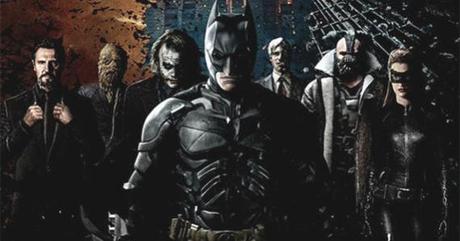When The Dark Knight was snubbed by the Academy for a Best Picture nomination, the rules were changed. With the category expanded to include as many as 10 slots, surely some popular movies will have a better chance at earning a nomination, or so the thinking went. This ended up having the opposite effect. Instead of ushering us into a world in which well-reviewed blockbusters are regularly nominated thus giving more casual movie fans an actual horse (or two) in the race for Best Picture the Academy just keeps nominating more indie movies and traditional Oscar bait. Sure, there have been exceptions. A few blockbusters, like Mad Max: Fury Road and District 9, made the cut. But the average Best Picture nominee since 2011 only grossed around $60m domestic. In some years, only one of the nominees even grossed more than $100m.

Perhaps this simply means few blockbusters have actually been worthy of a Best Picture nomination. We're not about to nominate a Transformers movies, after all. Hey, they can't all be The Dark Knight. The Oscars have always been an end-product ordeal. The Academy can only react to what Hollywood has to offer.
What about Wonder Woman, though?
Or Deadpool?
Or Skyfall?
Or smaller-budgeted, but high-grossing dramas like Gone Girl and Straight Outta Compton?
The Producers Guild of America nominated all of those for its Best Picture award. No dice with the Academy, though. Last year, they both snubbed Logan, Blade Runner: 2049, Baby Driver, Star Wars: The Last Jedi, and War for the Planet of the Apes (at least for Best Picture).
Meanwhile, the ratings continue to plummet. Just take out a piece of paper. Write down the year 2014. Then draw a straight line down from there. That's been the story with the Oscar ratings, posting ongoing year-over-year declines. As I previously wrote:
The last time the Oscars actually saw a year-to-year ratings increase was from 2013 (when 40 million watched Argo beat, among others, Django Unchained, Les Miserables and Silver Linings Playbook) to 2014 (when 43 million watched 12 Years a Slave beat American Hustle and Gravity). It's been a steady decline ever since, regardless of host or combined box office of the nominated movies. Not even nominating blockbusters like Mad Max: Fury Road, The Martian and The Revenant (combined worldwide box office: $1.54 billion) in the same year made a difference.
You might have thought last year would have been better. Mega-hits like Dunkirk and Get Out were not only both nominated for Best Picture, they each had a legit shot at winning, unlike in past years when the token blockbuster clearly had no chance. Shape of Water or Three Billboards were the obvious frontrunners, but an upset was at least a possibility. Beyond that, coming off the previous year's "It's La La Land!"/"Ha, ha - just kidding. It's Moonlight " fiasco injected a fresh sense of uncertainty. What category would they fuck up next? Ratings gold, right?
Sigh. Cue the sad trombone music, via Wikipedia:
The American telecast on ABC drew in an average of 33 million people over its length, which was a 4% decrease from the previous year's ceremony. The show also earned lower Nielsen ratings compared to the previous ceremony with 22.4% of households watching over a 36 share. In addition, it garnered a lower 18-49 demo rating with a 9.1 rating over a 26 share among viewers in that demographic. It also had the lowest U.S. viewership since the 80th ceremony in 2008, which averaged 32 million viewers
Bright side? That still ranked as the eighth most watched TV broadcast of the year.

Thus, the ongoing dilemma at the heart of the Oscars. An awards shows which was founded so long ago as a union-busting measure is now a cultural institution with prime TV real estate. The 30-second ads during the telecast still go for around $2m, and ABC happily re-upped with the Academy in 2016 to formally continue airing the telecast through 2028. The Academy is still using its funds to finish its long-gestating film museum in Los Angeles.
Yet at the same time, Netflix, Amazon, and soon Disney's original production machines are challenging the definition of what even qualifies as a "film." The middle continues to fall out of the film industry, meaning what would have once been Best Picture contenders are now bypassing film altogether and instead becoming TV shows. Hollywood's general push toward worldwide appeal has thus resulted in the Academy honoring increasingly smaller films with increasingly smaller box office totals. As I previously argued, it's not great for ratings, but when Birdman ('15 Best Picture winner), Spotlight ('16 Best Picture winner) and Moonlight come out they deserve to be honored, regardless of ticket sales. Awarding those films at least ups the chances more people might seek them out.

But how many times can the Academy keep ignoring those movies people actually go to see? How often must the whole affair be invalidated by history, looking back at the movies we still talk about today versus those the Academy deemed more fitting of a tribute ( Driving Miss Daisy, anyone?).
Apparently, Academy president John Bailey has decided that all has to stop now, or at least as much as possible. Here's a small part of the letter the Academy Board of Governors just released to members, "We will create a new category for outstanding achievement in popular film. Eligibility requirements and other key details will be forthcoming."
Further changes include an earlier telecast (February 9th instead of February 23rd) and a strict mandate to limit the show to three hours, which will mean handing out some of the awards (sorry, short categories) during commercial breaks and airing only the highlights later in the broadcast. The earliest telecast will eliminate that awkward waiting period between all of the other major awards shows (other than the Indie Spirit awards) and the Oscars. The shuffling of less popular categories to off-air follows the leads of other awards shows, like the Grammy's, although at least here the winners will get some screen time, albeit via truncated highlights.
The popular film addition, though, is more unexpected. I've seen awards experts recommend reinstituting the old Best Newcomer award for actors, and there's the Golden Globes chestnut of bifurcating nominees between Best Comedy and Best Drama. Outstanding Achievement in Popular Film, however, feels like the last resort in the ongoing effort to force members to nominate better-known movies. Fine, nominate Call Me By Your Name, if you must, but now we also have a Popular Film category! This is almost a return to the Academy's first year when there were separate final awards for Outstanding Picture and Unique and Artistic Picture.
While we await further details on how exactly this will work, let me know what you think about this idea from the Academy. Does this threaten to devalue the Best Picture even more? What kind of impact might it have on box office? How will they even define eligibility?

